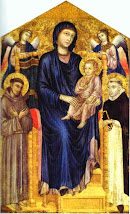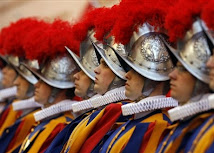Congratulations to these kids, I suppose, for having paid attention to their catechists - for such consistency in responses is clearly the result of effective teaching. Sadly, however, their catechists are misinformed, and thus so are their pupils.
I will begin by explaining why this misconception is based on flawed logic. In another post I will explore the Theology of this sacrament of initiation.
Teenagers relish being given adult roles and adult responsibilities. Not only does it enhance their self-esteem to fulfill such roles, but it usually serves as effective training for when they will fully assume adult duties. So it seems natural that if one wants to enhance a young person's interest in something, present it in the guise of a passage into adulthood. That the renewal of baptismal promises is a part of the rite of confirmation lends additional credence to the notion that the confirmandi are "speaking for themselves" where their parents had once spoken for them.
The fact is, though, many of these young people are attending confirmation classes week in and week out under some sort of compulsion. It might be directly from parents who take seriously their responsibilities as the first teachers of the faith. It might be a desire to set a good example for younger siblings or to dutifully follow in the footsteps of older ones. The bottom line is that few of the confirmandi wake up one morning and decide, "Hey, I want to claim this being Catholic thing for myself." We do kids a disservice when we tell them that this is the type of decision that must precede the choice to be confirmed. It implies that if they have not had this epiphany then they should not seek the sacramental grace of confirmation. But confirmation is not a Catholic Bar Mitzvah.
Being a Catholic is not about saying "Yes" to God one time at age 16. It's about a lifetime of saying "Yes" to God, particularly when it's difficult or challenging, or unpopular to do so. Failure to recognize this is precisely the flaw with the "once gained, never lost" mentality of those who stress the importance of "getting saved" over against a life of discipleship. But confirmation is not about getting saved.
So, What is Confirmation and what is it for? Put simply, it is the conclusion, the fulfillment of the sacraments of initiation: Baptism, Chrismation, and Holy Eucharist. The Eastern Churches preserve the inherent unity of these sacraments by celebrating them altogether, but the ecclesiology of the Western Church dictated that in most circumstances they would be experienced separately.
The Catechism of the Catholic Church is clear on both the theology and historical development of the sacrament and its effects. These I will treat in a second post.





No comments:
Post a Comment